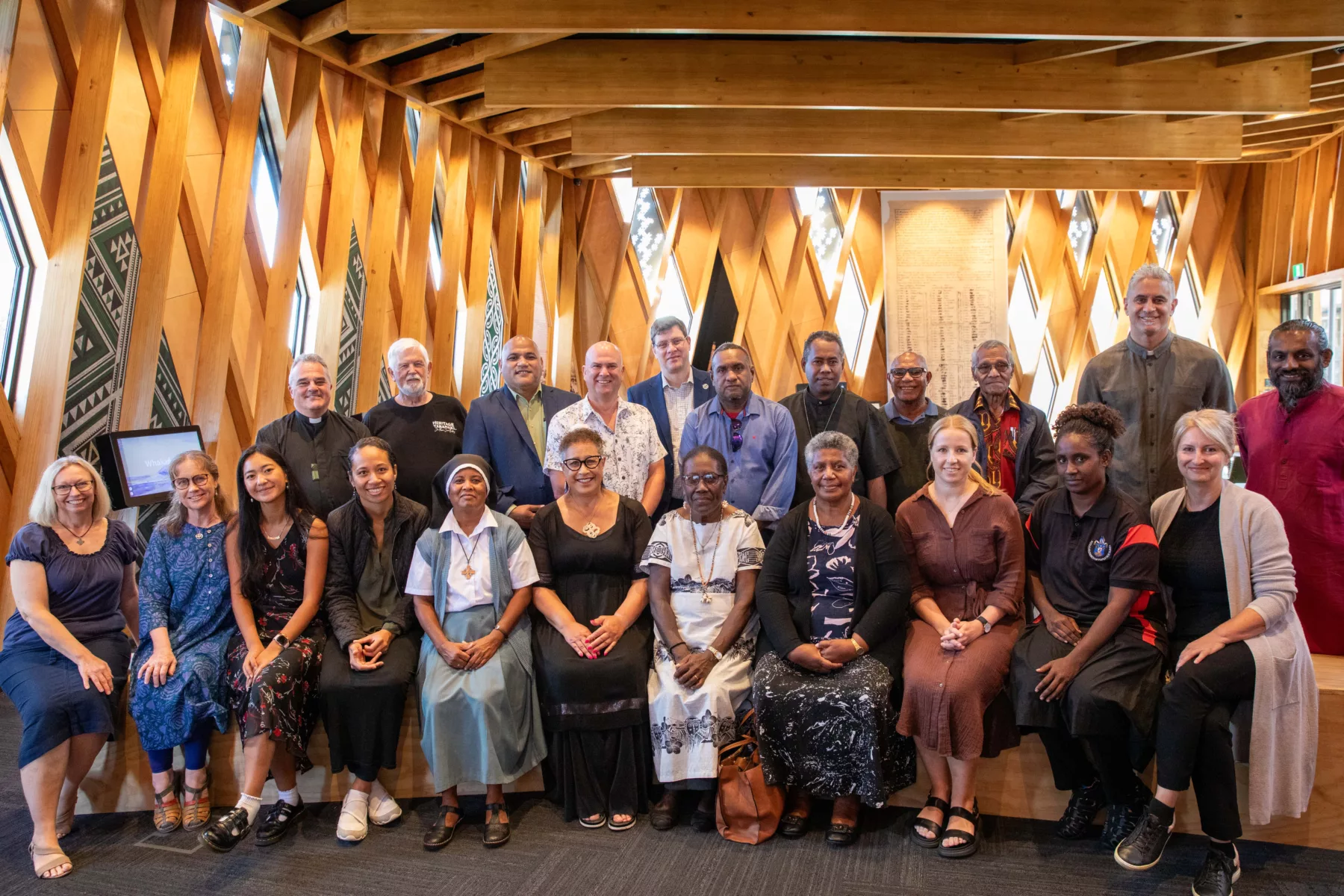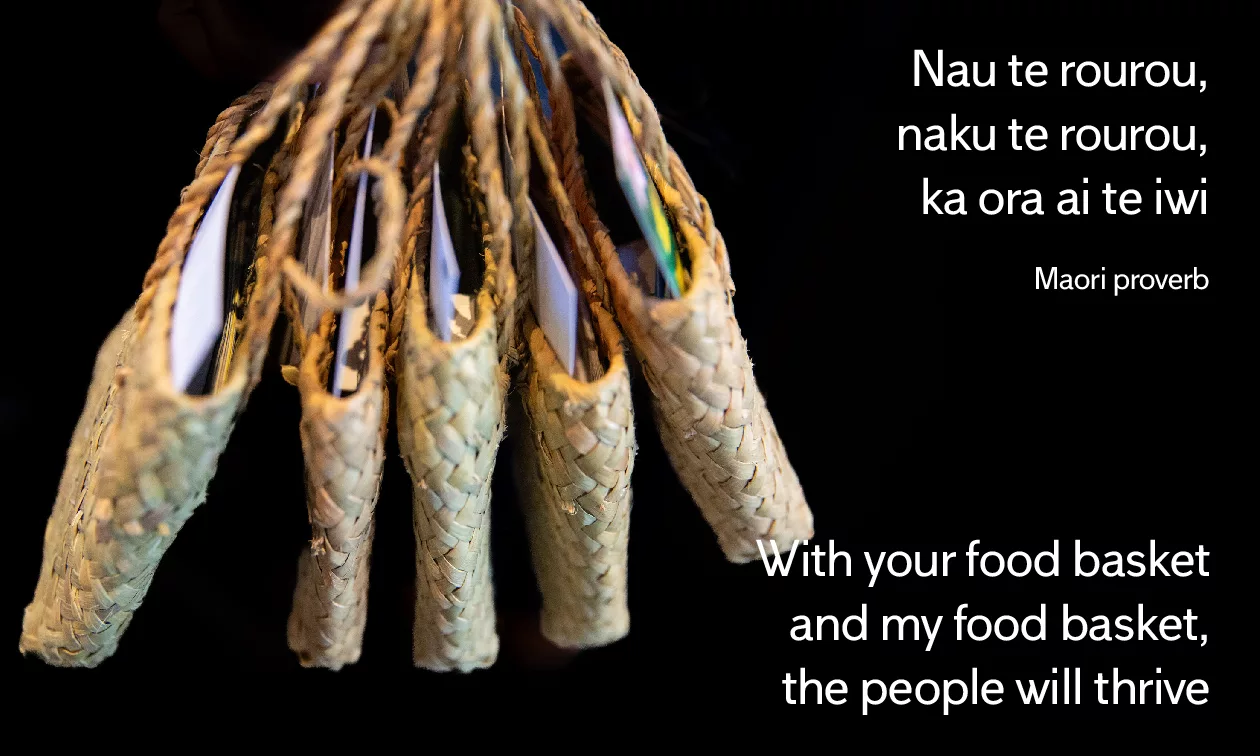The hongi is the traditional Māori form of greeting. It involves touching foreheads and noses and exchanging breath. This was the way the members of ORAC (the Oceania Regional Advisory Council to the Anglican Alliance) were welcomed to their meeting venue, Te Whare Hononga, at Taranaki Cathedral in New Plymouth, New Zealand.
The building, whose name means ‘the house that binds’, was the perfect venue for the gathering, its rich Māori symbolism echoing the nature of the meeting. The building is designed to represent a woven basket in which food is gathered and shared for mutual sustenance. And the sharing of breath in the hongi was symbolic of the way ORAC members would share breath together over the next few days as we con-spired (literally, ‘breathed together’) – talking, sharing, dreaming and planning together.
The ORAC participants comprised lead Anglican development practitioners from Papua New Guinea, the Solomon Islands, Vanuatu and Polynesia; representatives of Anglican agencies working in the region – the Anglican Board of Mission (Australia), Anglican Overseas Aid (Australia), Melanesian Missions UK, USPG and our hosts, Anglican Missions (New Zealand); and Anglican Alliance staff.

Participants in the meeting
This annual gathering enables coordination and cohesion across the development programmes in the region, the identification of emerging issues and the building of relationships. The meeting focused on the four priorities identified at previous ORAC meetings: Agents of Change; disaster resilience and response; safeguarding; and the environment, including the Communion Forest. For each area, updates on work since our last meeting were shared, plans for the coming year agreed, and the long-term vision across the region developed. These are summarised in the video.
Key points for each area of work included:
Agents of Change
Agents of Change continues to thrive in Papua New Guinea and the Solomon Islands. Plans were developed to expand the reach of the programme to Vanuatu, Fiji and Australia. Within the Solomon Islands, as well as rolling out the course in four dioceses in the coming year, it is hoped to establish Agents of Change in the ministerial training centres, using it as part of the discernment process for potential ordinands. In Papua New Guinea, Agents of Change has now been delivered in all five dioceses, with a further training expected in New Guinea Diocese. The course is also being integrated into the literacy programme run by the Church Partnership Programme (through the Anglican Board of Mission), providing a next step for people who have completed the literacy programme.
Environment including the Communion Forest
Melanesian Missions UK (MMUK) has, at the request of the Anglican Church of Melanesia, produced a booklet to help communities in Melanesia adapt to the changing climate and sea level rise, for example by changing the crops they grow to ones that can tolerate more saline soil.
There is a growing number of Communion Forest initiatives across the region and energy to do even more. Five objectives agreed by the group were to:
- Map all existing activities.
- Increase the number of activities, with the long-term aim of having at least one Communion Forest initiatives in every diocese in the region.
- Increase the variety of projects, especially taking the nature of the region into account, for example by focusing on marine environments such as coral forests.
- Increase capacity for conservation, drawing on local knowledge and partnering with external partners such as government forestry offices.
- Increase capacity for advocacy, building on the work of the Franciscans in the Solomon Islands.
Safeguarding
Joining the ORAC for the first time was Sister Veronica Vasethe, Provincial Sister of the Sisters of the Church, who is the regional representative for the Safe Church Commission. To support Sister Veronica, ORAC members established a regional steering group to share knowledge and insights on safeguarding and help embed best safeguarding practice not only within development programmes but also in churches.
Partners in Resilience and Response
Outcomes from the meeting in Wellington were shared and discussed. With Cyclone Alfred, an unusual and destructive weather system developing on Australia’s east coast, disrupting travel plans, the need for enhanced disaster resilience and response was clear to all.
Rob Dawes, attending ORAC for the first time, said, “It has been an extraordinary experience to conspire together for good over the past few days. The effectiveness of the Anglican Alliance’s convening role has been very clearly demonstrated in the plans that have been made and the relationships built here. We learned a Māori proverb, which perfectly captures what the Anglican Alliance is all about: ‘Nāu te rourou, nāku te rourou, ka ora ai te iwi’, which means ‘with your food basket and my food basket, the people will thrive’. During our time together, we have shared our food baskets, nourished one another and seen how together we can help our communities thrive”.
During the meeting, we were blessed with the presence of Revd. Jay Ruka, the dean of Taranaki Cathedral, who shared moving stories of local Māori history and experience and the extraordinary moves towards reconciliation being made, some of which are captured in the two videos below.
The ORAC meeting ended with the presentation of the outcomes video to the primates and secretaries general of the region as they met for their annual fono (a Fijian word meaning a council or meeting).
Please pray for all the ORAC members as they put plans into action in the coming weeks and months. And many thanks to Kris Singh of Anglican Missions for creating the video.

